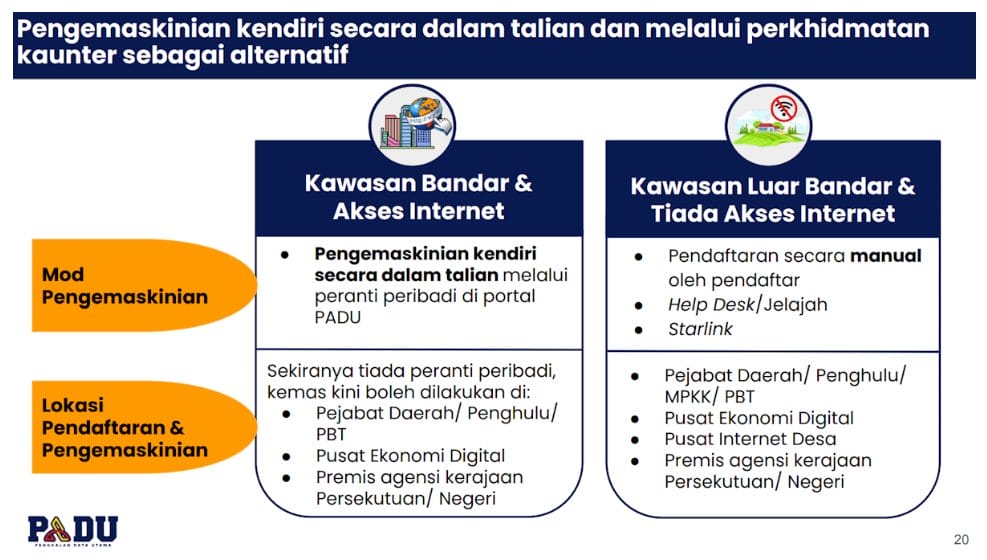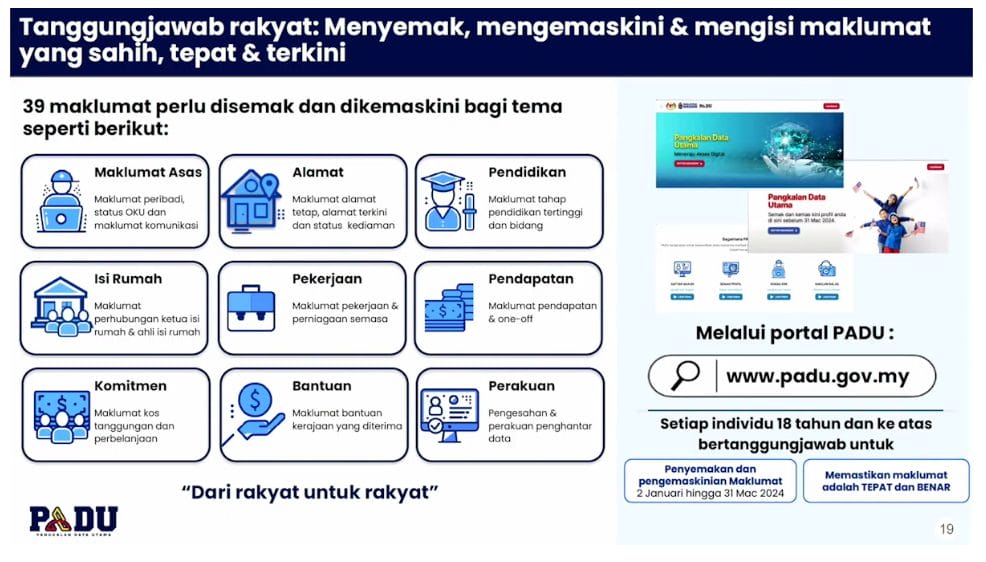PADU’s Purpose and Objectives
Pangkalan Data Utama (PADU) stands as a crucial initiative in Malaysia’s digital transformation strategy, spearheaded to address incomplete data concerns raised by Prime Minister Datuk Seri Anwar Ibrahim. Developed through a collaborative effort involving the Ministry of Economy, the Department of Statistics (DOSM), and the Malaysian Administrative Modernisation and Management Planning Unit, PADU has officially opened to the public.
1. Data Consolidation for Informed Decision-Making: PADU consolidates information from over 400 government agencies, providing the government with a comprehensive overview of the national household income. The primary objective is to streamline policymaking by ensuring accurate and complete data.
2. Targeted Subsidies and Social Protection: Managed by the Department of Statistics (DOSM), PADU aims to enhance data accuracy specifically for targeted subsidies and social protection programs. This focus aligns with the government’s commitment to fair subsidy distribution, as emphasized by Domestic Trade and Cost of Living Minister Datuk Armizan Mohd Ali.
3. Fair Subsidy Distribution: With the rising concern of fair subsidy distribution, PADU employs an effective identification process to ensure subsidies reach the intended groups. The system’s objective is to prevent misuse and optimize the allocation of the RM81 billion budget spent on subsidies last year.
4. Shift in Focus and Detailed Household Income Assessment: PADU represents a shift from traditional income categories (B40, M40, T20) to a more detailed household income assessment. This refined approach allows for precise subsidy allocations, enabling the government to tailor its programs based on household disposable income.
5. Encouraging Adoption and User Benefits: To encourage public participation, early PADU users can enjoy benefits such as receiving an enhanced Touch ‘n Go card with NFC capabilities and shopping discounts. These incentives aim to drive widespread adoption and active involvement in the verification process.
In essence, PADU’s purpose revolves around leveraging comprehensive data to inform policy decisions, enhance subsidy distribution accuracy, and ensure fair social protection programs. With a commitment to refining existing approaches, PADU plays a pivotal role in Malaysia’s journey towards effective and informed governance.
In essence, PADU’s registration process is designed to be user-friendly, comprising two straightforward parts. Here’s a step-by-step breakdown of the eligibility criteria and the registration procedure:
Eligibility and Registration Process
PADU invites Malaysian citizens and permanent residents aged 18 and above to participate voluntarily in the registration process.
Registration Process:
- Basic Personal Information:
- Begin by providing your essential personal details.
- Input your full name, MyKad number, and postcode. It is crucial that these details match the information on your MyKad.
- Furnish your mobile phone number to receive a One-Time Password (OTP).
- Account Creation:
- After receiving the OTP and verifying it, you will be prompted to create a secure password for your PADU account.
- After receiving the OTP and verifying it, you will be prompted to create a secure password for your PADU account.
- Electronic Know Your Customer (eKYC) Verification:
- This step involves a web browser-based eKYC verification process.
- Scan the provided QR code after setting up your PADU account to initiate eKYC.
- Follow the on-screen instructions, which include capturing images of the front and rear sides of your MyKad, along with a selfie.
- Despite the system indicating a potential 3-day duration for eKYC completion, many users have reported finishing the entire process in less than 10 minutes.
- Completion:
- Once you’ve successfully navigated both parts of the registration, your PADU account is created and verified.
Registration Window: PADU’s registration is open from January 2 to March 31, 2024. This timeframe allows individuals the flexibility to verify and update their socioeconomic information.
Manual Registration
For individuals who do not have access to a smartphone or computer, PADU offers a manual registration process. This method is especially designed to cater to residents in rural areas with limited or no Internet connectivity. Here’s a guide to the manual registration process:
1. Outreach Team Assistance:
- In areas without Internet access, the government will deploy an outreach team to facilitate manual registrations. This ensures that individuals in rural locations can actively participate in PADU.
2. Visit DOSM’s State Offices:
- To manually register and update information, visit the Department of Statistics Malaysia (DOSM)’s state offices. Trained personnel will assist you in the registration process.
3. Pusat Ekonomi Digital (PEDi) Centers:
- Individuals can also visit the nearest Pusat Ekonomi Digital (Digital Economic Center) for manual PADU registration. These centers are equipped to guide you through the process and answer any queries.
4. PADU Counters at Various Locations:
- The government plans to establish PADU counters at district offices, federal and state government agencies, and Pusat Internet Desa (Village Internet Centers).
- These dedicated counters aim to provide convenient access for manual registration and updates.

Data Fields Within PADU
The database contains eight main sections, encompassing personal, household, financial, and government aid-related details. Users are encouraged to thoroughly verify and update this information for precise subsidy allocation.
8 main sections within PADU:
- Basic personal information
- Address and home types
- Education
- Household members’ personal information
- Current work
- Income for the past 12 months
- Monthly financial commitment
- Government aid for the past 12 months

Subsidy Allocation Strategy
Economy Minister Rafizi Ramli emphasises PADU’s role in ensuring fair and targeted subsidy distribution. The system utilises comprehensive data analysis from various government systems to identify households eligible for subsidies.
System Security and Privacy Protocols
With an intense focus on data security and privacy, PADU adheres to existing Acts governing government department data. It’s set to integrate with an upcoming Omnibus Act, allowing agency-wide data sharing while safeguarding user information.
Integration with MyDID and Future Plans
According to Economy Minister Rafizi Ramli, PADU’s integration with MyDID aims to enable Single Sign-On (SSO) for government services, a vital step in Malaysia’s ongoing government technology initiatives set to be rolled out in phases.
Stay informed about PADU to ensure accurate data representation and potential eligibility for targeted government subsidies and aid programs.









